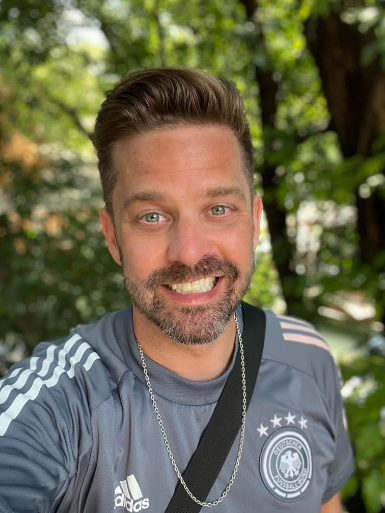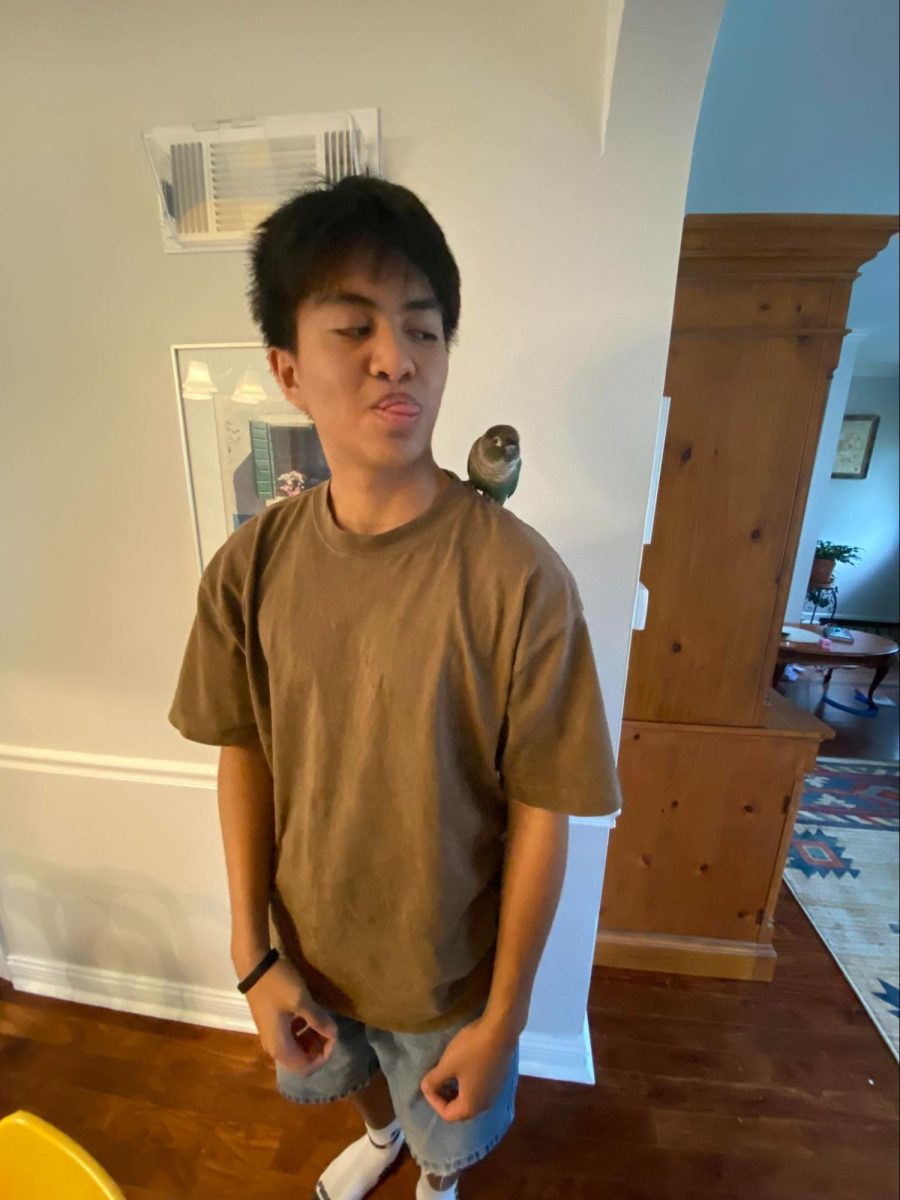What is your name and department? My name is Tom Neal and I’m in the World Languages Department.
What memory or experience first inspired your passion for learning foreign languages? When I was in, maybe like third or fourth grade, there was a visitor at our school from Japan and I just remember being really interested in learning about where she was from, her language, and wanting to know more about the world outside of where I was growing up. So I think it started there. That was the first time I met somebody from a different country and I remember looking at this book and learning how to say some things in Japanese to her because I really wanted to say something to her in her native language. I think that was probably the earliest memory.
What is your favorite part of teaching at Niles North specifically? My favorite thing about teaching here of course are the students. My students are so much fun, they are hilarious, and they make what we do in the classroom such a good time. I enjoy being here because of the memories that we create together in the classroom and just to see how they progress with the language, seeing what they do with their language skills. I always get emails from students several years later telling me what they’re doing for their job or what they’re up to and it makes me so proud to hear that they’re doing great things in the world. Languages can work with whatever major or career you do and just hearing how students incorporate that into their future is always so great. When they’re in school here, we have a lot of fun and I learn so much from them too. You know, Tiktok and the trends and all that stuff. So it helps keep me current.
If you could live anywhere else in the world, where would it be and why? I would probably say Paris because I love the city of Paris. It’s so big and there’s so much for it to offer. I also love that French people take their time, eat, and live a very chill life, which I like.
Why do you believe speaking more than one language is such an essential skill to acquire in today’s multicultural economy? When you understand and can communicate in somebody’s language, it makes you more informed about their culture because language and culture are so connected. It also shows that, especially as an American, a lot of people in the world know English. We know that most people study English all around the world but as an American, if you’re making an effort to learn their language it just shows that you’re willing to meet them halfway or show that you’re making an effort to understand where they’re coming from. So I think [language learning] just promotes understanding and harmony in general. It’s also good for your brain. Learning a language is a difficult thing but learning other languages helped improve my writing in English. It helped me understand my own language better, so it’s not just the benefits of the other language, it helps you understand your own culture and your own language better. There’s this Mark Twain quote that says, “Travel is fatal to prejudice”, meaning if you travel and see other parts of the world, it makes it harder to be prejudiced or judge someone because you’ve seen where they come from. You’ve seen how they live their lives and it helps you understand their perspective.
What advice do you have for students who are interested in pursuing a career related to linguistics? If you’re interested in language or linguistics, find a way to connect it to your everyday life because if you have a reason to use it every day, it’s gonna make it more relevant to you. Find a pen pal or find a group online, even if it’s a Discord group or a Reddit group that’s in that language and try and build it into your daily life of communicating in that language because if you don’t use it everyday, you won’t have that same motivation to make progress. But if you have friends who are speaking that language or a reason to speak that language, then it makes it a lot more doable. So just try to incorporate it into your day and try to start thinking in the language because thinking in English and translating it is not the way to go. It makes it a lot harder. Even if it’s just simple things, it’s always better to use the language that you have versus trying to translate from English because that makes it so tricky.
What techniques have you found to be the most useful when it comes to successfully acquiring foreign languages? I think immersion, just immersing yourself in the language. If you’re not able to go to the country itself, there are summer camps or other places where you can speak the language for weeks and weeks. I used to participate in this summer camp in Minnesota called Concordia Language Villages and you go there and it’s like a normal summer camp. You do volleyball outside, kayaking, hiking, all these outdoor activities, but you do it in the language. You have food from that culture and you meet other people who are learning that. It made it really possible to speak that language for weeks at a time without leaving the U.S. There are ways to immerse yourself in that language even if you’re not able to travel to the country. Of course going to the country would be ideal, even if it’s for a couple weeks like taking a class somewhere. Another thing that’s really useful now with video chat is finding a tutor or someone to talk to online through websites where you can do a language exchange or you can find tutors from all over the world and do video chat every week. It helps now that people rely a lot more on Zoom and video chat. It’s an acceptable way to make progress in a language by talking to a native speaker. Even if you go on Netflix and search the language that you’re learning, there’s tons of TV shows on there. Youtube has so many resources, there’s so many resources out there that if you want to do it, then you’ll find a way. If you go on Spotify, you can look at the top 50 songs in that country that are on the charts right now, so just seeing what music and films or shows are popular there and consuming that media, it helps you.
What has been the most difficult part of your language learning journey and how did you work to overcome that challenge? I would say the hardest part is keeping up with all the current slang because sometimes you’ll learn something and then ten years later it’s not the slang that people are using and they’ll laugh at you if you say some old slang. Once you learn one world language, it gets easier to learn other ones. I work with three or four languages usually and keeping everything organized in my brain isn’t the issue, it’s just keeping everything current by practice. If you’re using one language a lot and you’re not using the other one, I need to spend time reviewing and practicing so I don’t get too rusty. Keeping things fresh and making sure I can understand the current slang are probably the toughest things.
What is one common myth perpetuated about language learning that you’d like to disprove? One common language learning myth would be that it’s impossible to learn a language when you’re a teenager. Some people think it’s too late. Even as an adult, some people say, “It’s too late, my brain won’t do it,” or “I’m not good at languages.” Or some people say, “I can’t do that, I’m not good at it.” Everyone can do it. If you learn your native language, you can learn another language. You just have to try. People get kind of stuck on “oh, I’m not good at it” or “oh, I can never do it” but it’s just anxiety or them telling themselves they can’t do it. Everybody can do it. I’m not any smarter than anybody else, everybody can learn languages by themselves. It’s never too late to do it. It does take work and it takes getting used to. It’s a different kind of subject than any other subject. You can memorize all the vocab, but if you don’t know how to apply it or if you don’t try speaking it, you’re not just going to naturally be able to speak the language. Duolingo can only go so far, you actually have to go out there and talk to people.
How can foreign language education in schools be improved to be more effective? By starting earlier. Starting in high school is great but the earlier we start students learning foreign languages, the more beneficial it is. Having students start in elementary school and continuing through junior high and high school is really important. More dual language schools or schools where they’ll teach you math or science in Spanish or in Chinese and then you have your English class too. There are some schools around here that do that. Some of my colleagues have their kids go to those schools, but there’s not enough of them. Starting earlier and being more consistent is the way to go, and showing that we value that in our education system. I think now world language is kind of like music class, it’s this extra elective. If it’s seen as more of a core necessary class, then that would be great.










Cynthia Fey • Dec 20, 2023 at 3:27 pm
Such interesting questions — and they inspired fascinating answers from Mr. Neal!